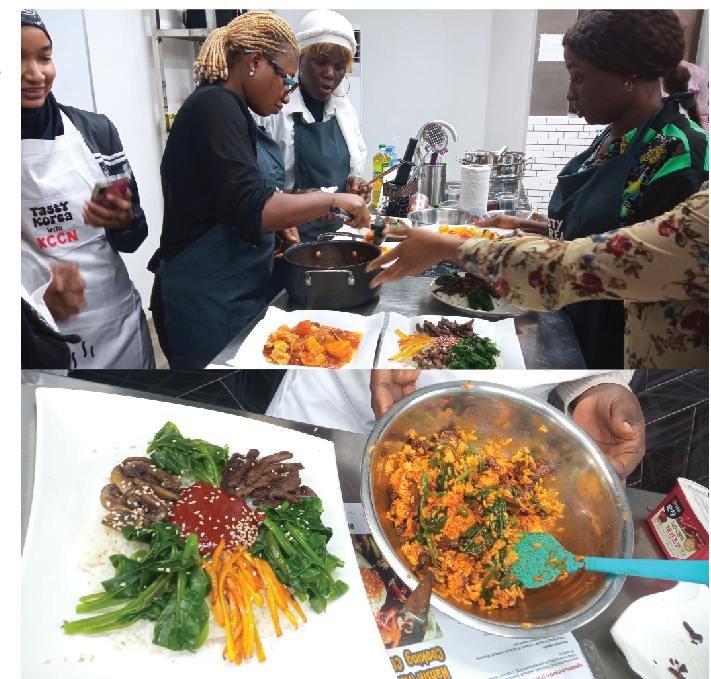At the fourth session of the Korean Cooking Class, food lovers are gearing up for the Korean Food Contest scheduled to hold in August.
Contrary to the first three sessions which featured professional chefs, this first out of four classes held within the week, comprised more of food lovers who are keen on participating in the competition.
Several discovered the contest via their Instagram accounts set to signal notifications of KCCN activities. They are motivated by their love of food and Korean Popular Culture including K-drama and K-Pop, to apply for the cooking classes organized by the Korea Culture Center Nigeria (KCCN) for professional chefs prior to the competition.
The menu of the day, Bibimbap (rice mixed with vegetables) and Dakbokkeumtang (braised spicy chicken), which are anchored around two main fermented soy sauces – Kookganjang (Light Soy Sauce), Jinganjang (Thick Soy Sauce) and Gochujang (Chili Pepper Paste), gave the participants an idea of what is expected of them at the competition themed: Korea Cuisine Based On Traditional Jang (Fermented Sauce) Culture.
“Korea has a long history of fermented foods and ingredients dating back to 400 BC,” said KCCN Cultural Events Manager, Su Yeong Kim. “In the southern parts of South Korea, some families are known for their often six months to twenty, even fifty-year-old fermented foods and sauces.”
Fermentation enhances the taste and extends the shelf life of foods. Health benefits of fermented foods include regulation of the immune system, promotion of weight loss, fights stomach inflammation and even slows the aging process.
For some participants, cooking with fermented sauces is not only interesting but has unlocked their dreams and imaginations towards innovative cooking.
Content Creator, Amarachi Doris A. said the classes taught her how to work around familiar local foods to create another national cuisine, referencing her first ever Korean meal (Hansik), which she prepared using the ingredients gifted her by the center.
Participating in the cooking class for the second time, gave her the courage to voice her dreams of owning a Hanok-style restaurant devoted to Hansik.
Fashion entrepreneur and K-drama fan, Cynthia N Madubueze who was excited to practice what she had only seen done in the movies said preparing a meal without artificial ingredients for the first time, was “surprising. And tasted nice”.
Henceforth, she will be burning data bundles, watching Hansik videos on YouTube in preparation for the competition that she is sure she’d win.
“I don’t know what dishes I’d be making for the competition but I have a lot of work to do. Perhaps I could make the dishes we were taught today.”
Still contemplating signing up for the contest, Engineer Sadiya Bindiya, said she is inspired nonetheless.
“I will tell you this, after this class, a lot of ideas are racing through my head. There is a sauce that is in-between the bean-paste and Gochujang. I am curious about that combination; of a sauce that is in-between. I think a lot can be done with that.”
“We hope competitors who are interested in food culture can find creative ways to use the Kookganjang, Jinganjang sauces and Gochujang to make food fusion,” said Kim.
Online registration for the Korea Food Competition is open till July 24. Post registration, a jury will select participants to the second and final rounds of the competition in August.










